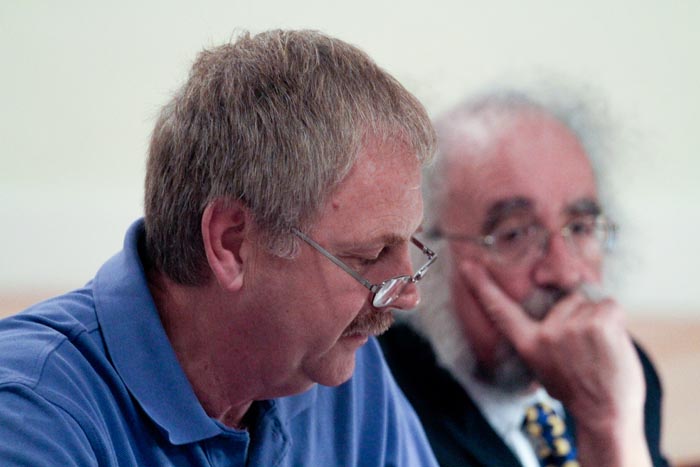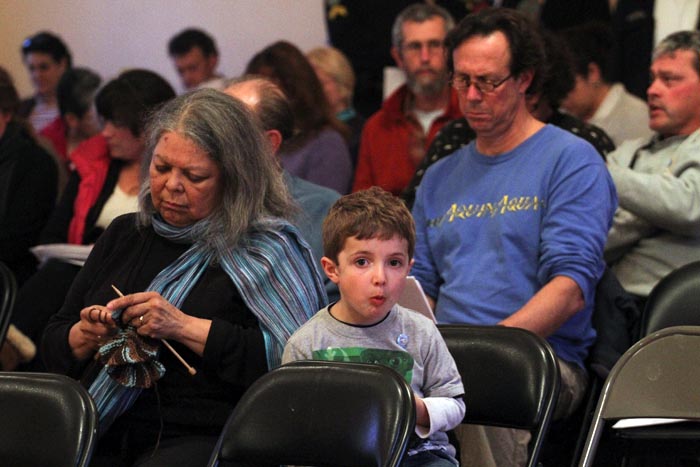Aquinnah voters agreed to condemn the federal government’s handling of the Cape Wind project, explore the use of solar panels at the landfill and trim the Tri-Town Ambulance budget at the annual town meeting Tuesday night. And an article to banish the practice of tabling controversial issues? That was tabled.
Nearly all of the 30 articles on the warrant passed during the three-and-a-half-hour meeting that saw much debate over the ambulance budget, an amendment to the town affordable housing bylaw and an article to reduce the size of the quorum.
A total of 65 voters attended; moderator Michael Hebert presided over the special and annual sessions.
In a display of solidarity, Aquinnah voters agreed that the federal government should have done more to involve the local community before issuing federal permits to Cape Wind for the construction of a proposed wind farm off the coast of the Vineyard. The article, the second to last on the warrant, was one of the few that passed with no discussion and only one objection.
“A lot of people are unhappy with the lack of process and we are sending a message to the federal government that this is not the way to do things,” selectman Camille Rose said. “And if more towns, particularly on the Cape and Island, make their feelings clear we might get a little more attention from [the government].”
When it came to approving the town’s $3 million budget, voters wanted to know why the selectmen only recommended $134,000 of the $160,000 requested by the ambulance service — and so did Aquinnah police chief Randhi Belain.
“In the budget the request is for a deputy chief and a chief, but the question is do they really need a deputy chief?” said selectman Jim Newman in explaining why selectmen took the deputy chief line item out of the budget.
“I would argue that the Tri-Town committee has done a lot of work over the past year, and there’s been no chain of command or structure. We’ve done a lot of work to provide a budget that would provide coverage, a chief, deputy chief and two full-time paramedics,” Mr. Belain responded, referencing a new state law that requires 24-hour coverage to maintain a paramedic license.
“I disagree with what the selectmen are presenting here . . . I would like to see the money stay. We believe we need a chief and a deputy chief,” the police chief said.
Chilmark and West Tisbury already approved their portion of the budget at their town meetings last month, each contributing $160,000 to the total $646,000 budget. The budget is up 41 per cent over last year due to the new law.
A few voters noted how long it took for an ambulance to respond to Aquinnah, and Mr. Belain said with a full budget and new positions there would be better coverage in the up-Island towns.
Mr. Newman asked if the selectmen from the three towns could sit down with the committee and review the budget.
“We don’t really have very much input into what’s going on at Tri-Town, and I know it has been fraught with many problems,” he said. “It’s been going on a long time.”
Mr. Belain agreed to a meeting and requested that someone make a motion to fully restore the budget, but no motion was made and the budget was approved as presented.
Voters agreed to begin investigating what it would take to house a solar array at the landfill, but not before passing an amendment to the article that specifies that the selectmen must come back to voters before any final lease agreement is signed.
“There would be plenty of room for input and it wouldn’t cost us anything,” said Ms. Rose, the selectman. But voters were uncomfortable with language that appeared to allow selectmen the ability to enter into a lease agreement without putting the proposal in front of the voters, and the article passed with the amendment.
A light moment in the long night came when planning board chairman Peter Temple, answering a question about how the planning board would know which types of projects to offer an alternative process under a proposed amendment to the zoning bylaw designed to streamline bureaucracy for small improvements like sheds, said, “It’s like pornography . . .” The room erupted in shocked laughter before Mr. Temple could complete the reference to former U.S. Supreme Court Justice Potter Stewart’s famous statement that he couldn’t define pornography, “but I know it when I see it.”
Earlier in the night, voters approved a series of spending items in a special town meeting that included $17,500 for a new chassis for the fire rescue truck and $5,000 to maintain the town’s access to Menemsha and Squibnocket Ponds. Voters also appropriated $20,000 for an emergency restoration fund for the Gay Head Light and $10,000 for a restoration project at the Aquinnah library.
Voters approved an affordable housing bylaw that loosens the rules for creating affordable housing on substandard lots. The bylaw reduces the minimum acreage required to create one-acre lots from four acres to three acres. It also gives managing authority to an Island nonprofit housing group in perpetuity, rather than by deed rider, making the parcel foreclosure-proof.
But Barbara Bassett questioned who was going to police the intent of the law and make sure it was followed as intended. Former housing committee chairman Derrill Bazzy said the extensive lease agreements governed by the nonprofit housing agency would ensure there would be no exploitation.
Voters still had a piece of their minds to share at the end of the meeting when it came to two of the last articles of the night. Selectmen proposed to reduce the quorum size of town meetings from 10 per cent to six per cent, or 39 people to 23 people, but voters stood firm on keeping the quorum as is.
“This thing keeps coming up and I don’t know how many times we have to tell you what the town wants,” Ms. Bassett said. “It’s too much power in the hands of too few.”
Voters rejected the article by tabling it.
In the final article, selectmen proposed to eliminate the option of tabling a question at town meeting, arguing it is used too often to stop the debate. Heedless of Ms. Rose’s assertion that the previous quorum size article had been a good example of using the tabling option improperly, the voters voted to table that article too.






Comments
Comment policy »